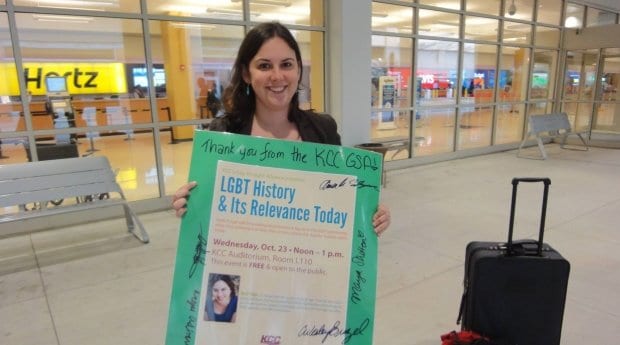Irretrievably, impossibly, implacably, Sarah Prager has always been a nerd for queer history. So when she ditched her nine-to-five job a year ago and launched Quist, the queer history mobile app, it was like coming home.
Prager “came out” at the age of 14, and because she knew of no other “out” people at her boarding school, she decided to look to history to find her brethren. “For me, learning about queer history was about finding community and knowing that I wasn’t the only one, that I wasn’t alone,” she says.
Eventually, through her involvement with the school’s gay-straight alliance, she began sharing what she knew with other students. “I think I gave ‘LGBT history of the day’ during the month when student clubs would put up their bulletin boards in the hall,” she says. “I made this whole timeline and printed out photos and all kinds of stuff.”
Almost a decade and a half later, on July 24, 2013, Prager launched Quist, a mobile app aimed at educating the world on queer history. The app is free on Apple and Android, has more than 800 historical events listed, and has been downloaded by approximately 18,000 people in more than 100 countries, including Russia, Jamaica and Iran, where accessing this type of information could be dangerous.
“Surprisingly, through the whole experience I haven’t gotten any anti-gay hate mail, and I know of no negative stories involving people having had Quist found on their phone and them getting into trouble because of it,” Prager says. “There are no Russian spies after me that I know of.”
Reminiscent of the hallway bulletin-board project from Prager’s boarding school days, the app works primarily in a “on this day in history” format, and users can tap to see the full story. They can also explore the other events listed on the app, using various search methods — keyword, decade, date — or they can tap on a map of the world and see all the events listed for a particular country.
The app was developed and has grown primarily through the efforts of dedicated volunteers worldwide. Anyone wanting to add events to the app should fill out this form.
For the anniversary of the launch of Quist, on July 24, Prager announced a new feature. Each event is listed in English, but for events that took place in non-English-speaking countries, there is the option to see a translation in the language(s) used in that country. So far, there are translations in Arabic, Hebrew, Korean, Russian, Spanish, Croatian, Danish, German, Mandarin, Portuguese and Serbian. Those who’d like to volunteer their language skills to translate events into languages not among this dozen, can contact info@quistapp.com.
As if founding the app weren’t enough of a coming-full-circle experience, in October Prager went back to her school to speak about queer history. “The GSA’s bulletin board [that announced that I was coming to talk] was the same bulletin board I’d been decorating years before,” Prager says.
Quist is currently raising funds to maintain and expand its functions.


 Why you can trust Xtra
Why you can trust Xtra


